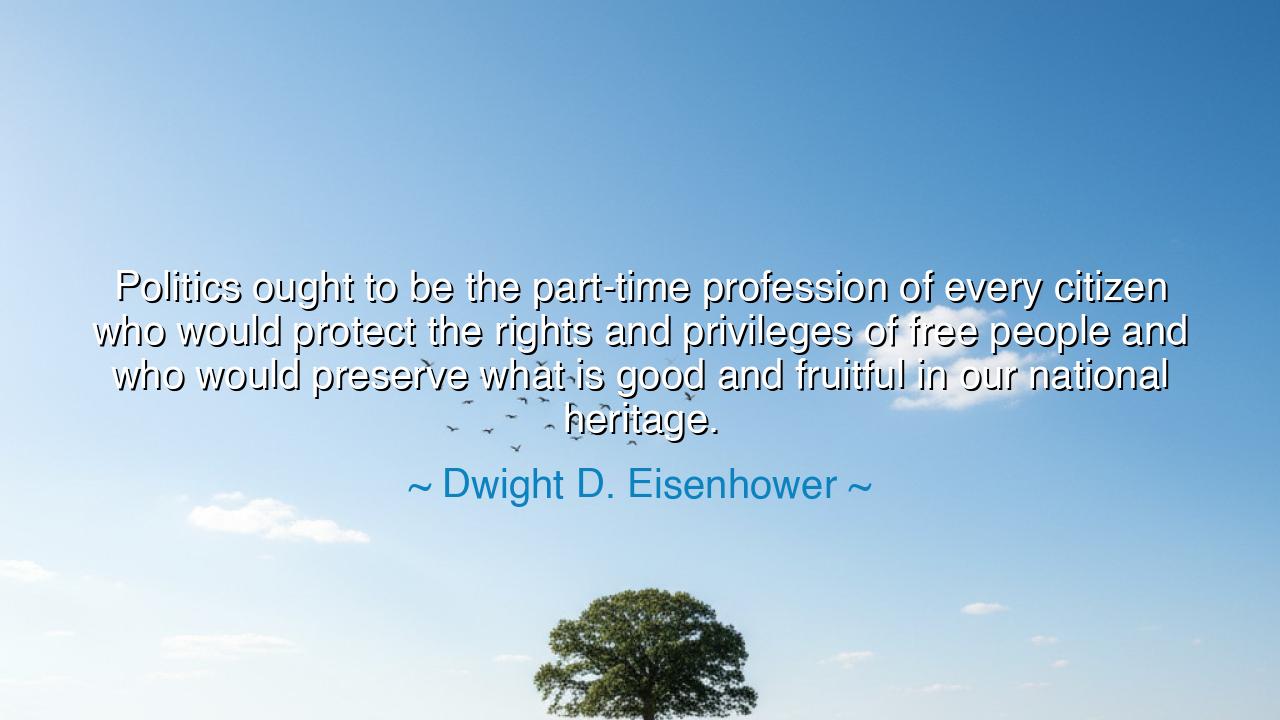
Politics ought to be the part-time profession of every citizen
Politics ought to be the part-time profession of every citizen who would protect the rights and privileges of free people and who would preserve what is good and fruitful in our national heritage.






Hear, O guardians of liberty, the steadfast words of Dwight D. Eisenhower: “Politics ought to be the part-time profession of every citizen who would protect the rights and privileges of free people and who would preserve what is good and fruitful in our national heritage.” This is not the voice of idle counsel, but the charge of a general who once led armies and later led a nation. In these words lies the truth that politics is not the domain of rulers alone—it is the sacred duty of every free soul who would guard the blessings of freedom.
For when only the ambitious and the corrupt hold sway over politics, liberty itself begins to decay. But when the common citizen lifts even a portion of the burden, tyranny finds no soil in which to root. Eisenhower’s wisdom reminds us that citizenship is not a passive gift, but a constant labor—a part-time profession demanded of all who would keep freedom alive. Like tending a fire through the night, vigilance is needed, lest the flame of democracy be extinguished.
Recall the tale of the Athenian democracy, where citizens, though farmers, artisans, and traders, set aside their labors to gather in the assembly. They debated laws, judged magistrates, and bore responsibility for their polis. It was not perfection, for Athens had its flaws, but the spirit was clear: governance belonged to all, not to the few. In this same spirit does Eisenhower call across time, urging that each citizen take up a share of the work to preserve what is good and fruitful in the heritage of their nation.
So too, in the founding of America, men and women of ordinary rank bore extraordinary burdens. Farmers became soldiers, printers became patriots, and merchants became architects of a republic. They understood that freedom, once won, could only be kept if every generation bore arms not only in war, but in political vigilance. To leave such matters to the ambitious alone would be to surrender the republic into their hands.
Therefore, O children of the free, let this lesson be engraved upon your hearts: politics is not the trade of the few, but the responsibility of the many. To preserve the heritage of liberty requires more than speeches and banners; it requires the daily devotion of citizens, who, in even the smallest acts—casting a vote, raising a voice, defending a principle—become guardians of their nation. For freedom is not preserved by chance, but by the unyielding watchfulness of those who cherish it.






TVTrang Vu
This quote by Eisenhower makes me reflect on the role of the average citizen in politics. If every citizen took part in politics, even in small ways, we could strengthen democracy and protect our freedoms. But with so many distractions and responsibilities in our daily lives, how can we ensure that people prioritize political participation? Can politics be made more accessible to everyone, or will it always remain the domain of the highly motivated few?
PTNguyen Thi Phuong Thao
I think Eisenhower’s idea is an important one, as it promotes civic engagement and responsibility. In an era where political decisions can deeply affect our lives, shouldn’t everyone be involved, even if just on a part-time basis? But then again, what does 'part-time' really mean in a political context? Could a few hours of volunteering or participating in local elections be enough to preserve our national heritage, or is more required?
LQPham Le Quyen
Eisenhower’s notion that politics should be a part-time profession for all citizens seems like a call for more civic responsibility, which I appreciate. However, can everyone really find the time to engage in politics while balancing their personal and professional lives? I wonder if his vision is realistic in today’s world. How do we encourage people to become more politically active without making it feel like an overwhelming task for busy citizens?
NLCong thanh Nguyen luong
Dwight D. Eisenhower's call for politics to be a part-time profession for every citizen resonates with me. It challenges the idea that political participation is the sole responsibility of elected officials. If more people actively engaged in politics, even in small ways, perhaps we’d have a healthier democracy. But, how can we encourage more people to participate without overwhelming them with the complexities of politics? Could more accessible platforms for participation help?